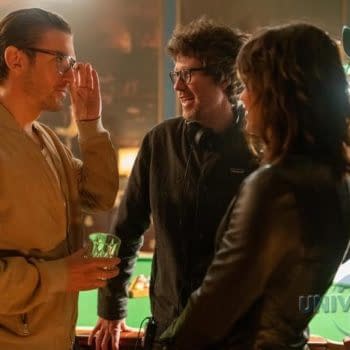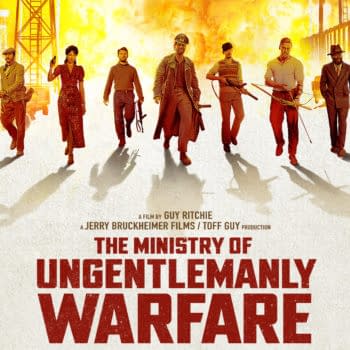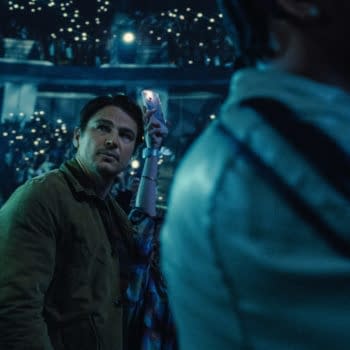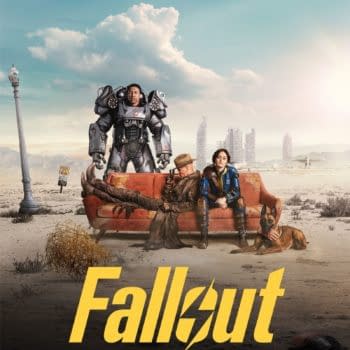Posted in: Movies, TV | Tagged: film, HRL, star trek, star trek: discovery, tv
Star Trek: Discovery Absolutely Earns Its Place in the Star Trek Continuity
Ever since it premiered, Star Trek: Discovery has received repeated criticisms and commentary asserting that it doesn't fit in with classic Star Trek continuity and ideology. They often try to point out that the show is darker, that it's all about war instead of peaceful exploration and people swear in it, among other observations.
While scrolling through Twitter in bed last night, I stumbled across yet another headline that suggested the argument that Star Trek: Discovery has done away with the idealism of old to replace it with cold realism. And you know what… nope, done — I need to tackle this now.
Because Star Trek: Discovery absolutely is just like classic Star Trek in terms of ideology, and is in fact a really good entry in the long cannon of the series.

To go over it, it might be worth breaking down the concerns I keep seeing in relation to the series.
Now, bear in mind, I am not saying that there aren't differences — of course there are. But these changes are largely around some simple facts about the show budget, improvements to make-up and special effects, and the fact that the show is not on network television but is online, rather than any difference in ideology. Also, there's a change in the kind of entertainment audiences enjoy now, with a greater focus on long-form storytelling and continuity, which allows Discovery the chance to explore ideas over longer than a single episode.

It's All About War
Many have tried to argue that Star Trek is not a series about war, but frankly, I just don't know how they can make that argument. Granted, Starfleet is meant to be a primarily scientific organisation, not military (despite the Naval terminology used to assign roles), but Star Trek is no stranger to war.
The Original Series saw the Federation in a kind of Cold War with the Klingons, Star Trek: Deep Space Nine was set around a region that had been occupied by enemy forces now freed, the continued aggression between Cardassians and the Marquis, and finally, the full on war with the Dominion. Hell, DS9 even contained a Starfleet warship.
That Star Trek: Discovery is set between Enterprise and The Original Series means that it takes place during the full ignition of the Starfleet/Klingon war means that of course that war will play a role in the series, but that doesn't mean that the series is all about war.
It's more about the effects of war on an organisation that is not structured for it (the Discovery, Starfleet's "secret weapon", is a science vessel, not a warship), as well as the people who have faced the horrors of war and death and how it affects them. Both Captain Lorca and Michael Burnham are clearly suffering from PTSD (again, not an issue Star Trek has ever avoided before), and we see how these two characters make choices based on the effects of this that sometimes override their general thought process.
The Characters Swear
Yup, Star Trek: Discovery drops a few bombs here and there, but this isn't a sign of a change of ideology or a push to gritty realism. Simply put, it's more around the fact that the show creators can get away with it whereas previous Star Trek series couldn't. This was because of the network constraints that Discovery just doesn't face.
Those who try to argue that the positive, hopeful future of Starfleet means swearing simply doesn't happen? Come on. The human language is flexible and mutable enough that by then there'd probably be whole new curse words. And strictly speaking, the old Star Trek series found its way around it, with technically several terms in Klingon one could class as curse words.
There is the element that Star Trek: Discovery using cursing is a superficial method of heightening the tension of the situation, but again, this does not show a move away from the ideology of Star Trek.

It's Very Dark
For one, there is a simple contextual explanation for this in many scenes, due to Lorca's eye condition. However, again, a lot of it comes from the lack of the constraints the other shows in the cannon had. Because of the online nature of Star Trek: Discovery, it means they have scope to tell a greater range of stories in terms of content and how far they can go.
The older series were pretty bloodless, but not because the situations were bloodless — Klingons wave swords around, slashing folks with nary any viewed bloodshed. Characters sometimes are killed brutally with little in the way of physical evidence… but this is because network television, and the time slots they were aired in would have not allowed for it. Occasionally, Star Trek did like to push the boundaries: one scene in Deep Space Nine springs to mind with a character killed in transporter sabotage, being burned alive in the confinement beams, the edges of their charred corpse just visible on the screen.
And remember, the movies were often far more brutal, as they had the scope to explore this. Many more of them contained bloody battles — Star Trek: Wrath of Khan had the body horror of alien insects entering the ear, and Star Trek: First Contact presented the brutality and body horror of the Borg far more than the Star Trek: The Next Generation TV show ever could.
Discovery doesn't have these concerns — it can push the boundaries and tell these tales and really explore them fully. That's why the exploration of the mental ravages of war are being much more deeply explored, instead of being a single-episode story arc.
This isn't contrary to the ideology of Star Trek; far from it. Star Trek has often been about the exploration of the human condition and mirroring the times. The Original Series featured ideas of the Cold War, and now Star Trek: Discovery is exploring the conflict between building bridges and isolationist attitudes, and issues surrounding mental health and PTSD.

Ultimately, Star Trek: Discovery being able to show more darkness as well as light doesn't show a push towards realism at the cost of classic Star Trek idealism. If anything, it tempers the idealism in a new way maybe, but Discovery is still plenty idealistic.
The series focuses on how relationships and confronting her mistakes and past can help Burnham through her situation. The crew, when confronted with an intelligent vibrational energy species, don't immediately take a realist, cautious action, but rather try to establish first contact straight away. Stamets's excitement over science and concerns over how his discoveries can be used show and idealism that is confronted by realism, but it never diminishes the idealism in the first place.
The idea of idealism not being able to coexist with realism is an odd one. I consider myself an idealist, and I still believe in the core goodness of the human spirit, but that doesn't mean I ignore the reality of the world around me. I still see, realistically, that things seem dark and are pretty damn frightening — we have world leaders playing chicken with nuclear weapons, the spate of revelations of men using their influence to prey on women, and continued harassment, hate, and fear running rampant. But despite this, I see these realities and still think we can get better, and that this is just the process of us reaching that. Idealism isn't the denial of realism, nor is realism a denial of idealism — the two outlooks can coexist, tempering each other.
Star Trek: Discovery is not throwing the idealism baby out with bathwater, and it isn't wholly dark, grim realism either. Discovery has idealism tempered by realism, sure, but that doesn't mean it gives up one for the other. Star Trek: Discovery still contains a lot of hope, and at its core, Star Trek: Discovery still contains that idealism and humanity that is at the heart of all of Star Trek.






















